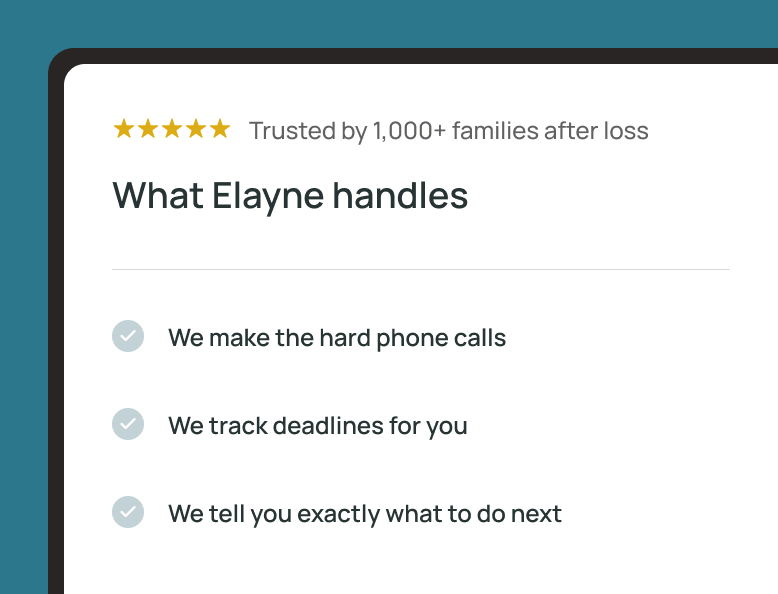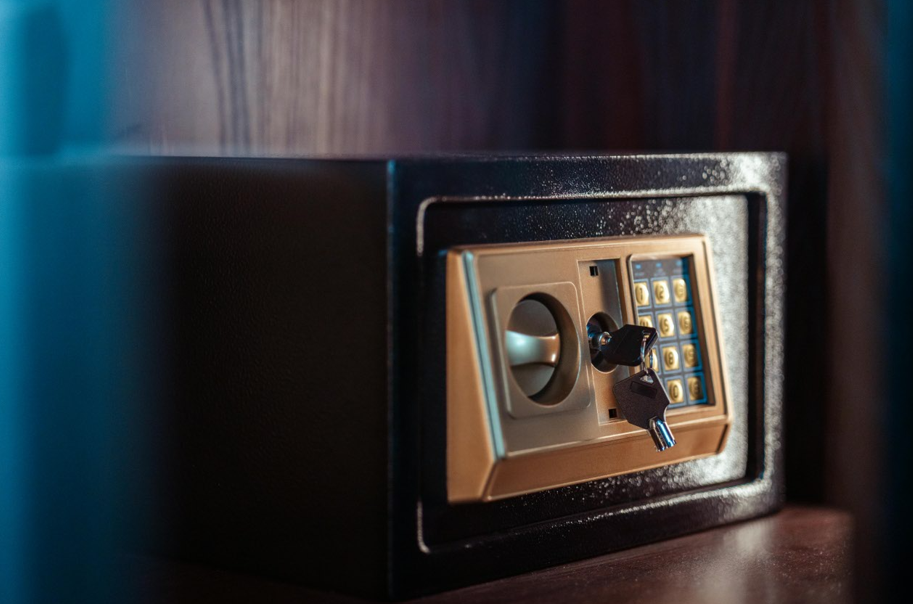After a loved one dies, there are so many legal and administrative details to take care of, all while coping with grief and caring for family and friends who are also grieving. It's easy to feel overwhelmed, so in this article, we'll walk you through how to manage one of those important administrative details: closing bank accounts, a necessary step in handling a person's affairs and settling an estate after death. To make things easier, we'll explain the documents you'll need and the procedures you'll have to follow, and we'll provide a list of leading U.S. banks with their specific requirements.
TLDR:
- You need a death certificate and account details to close a bank account after someone dies.
- Joint accounts transfer to the surviving owner; in most cases, solo accounts freeze until probate is complete.
- Specific closure requirements may vary from bank to bank.
- Elayne can handle account closures and estate paperwork so you can breathe easier and focus on yourself, your family, and your friends, instead of time-consuming administrative tasks.
What Happens to a Bank Account When Someone Passes Away
When a bank account owner dies, the account is turned over to a joint owner or beneficiary if there is one. If there isn't one, the account typically becomes part of the owner's estate. Then the disbursement of funds is handled in probate court. (We'll examine these scenarios in more detail below.) In rare cases where no heirs or estate representatives are found, unclaimed funds may eventually be turned over to the state’s unclaimed property division.

If the account has a payable on death beneficiary, the bank account balance goes to the beneficiary after the account owner dies. A beneficiary can claim bank account funds by contacting the bank and providing a death certificate. (If you or a loved one is making estate plans, designating a payable on death beneficiary for your bank accounts is one way to make carrying out your after-death plans less complicated.)
What You Need to Do Before Contacting a Bank
Before notifying financial institutions about a loved one's passing, create a complete list of all their financial accounts. Consider starting a spreadsheet to keep a record of all your communications and contacts. When speaking to a bank representative over the phone, always ask for a name, a job title, and a direct phone number and email address, and keep this information with your notes about the call.
Requesting several copies of the death certificate from the county clerk or the funeral director will also be helpful. Almost all banks will require one to close an account. These individual copies will be needed for estate planning amendments, legal accounts, and financial institutions.
Trustees and executors should make sure they have the trust document and, if possible, the last will and testament. (If the deceased had a will or trust but you are not the trustee or executor of the estate, it's best to consult the executor of the estate for further guidance on the next steps.)
What Happens If Someone Doesn’t Have a Will
When someone doesn’t have a will, intestate succession laws will determine how their assets are distributed. These laws are complex, and in most cases, only immediate family members are entitled to inherit. The account will enter the probate process, and assets will be frozen until the estate is settled. Funds may be released to cover immediate expenses such as funeral costs, after which debts are paid and remaining funds distributed to the legal heirs.
What Happens to a Joint Bank Account When Someone Passes Away
Typically, if an account is jointly held with rights of survivorship, the surviving account holder retains the entire account balance. It doesn't matter if the deceased person was the one who typically handled the account. Joint bank accounts do not go through the probate process. (Note that not all joint accounts automatically include rights of survivorship; if the account was set up differently, the deceased’s share may still go through probate.)
Bank Contact Information
Below, we'll list major U.S. banks, their contact information, and what you'll need in order to close an account. When closing an account, you’ll need a copy of the death certificate, investment or bank account numbers, the deceased's full legal name, and their complete social security number.
Also, you should always bring, or have ready, valid identification when closing an account. Although we've listed the basic necessary information and documents you need, you may also need to provide a copy of a trust or will, the deceased's birth certificate, insurance documentation, a court appointment of executor, and current bank statements.

How to Close a Chase Bank Account
To close a Chase Account, you can contact their Estate Services department at 1-866-926-6909, Monday to Friday, 8:00 a.m. to 7:00 p.m. Eastern, or schedule an appointment at a local branch.
How to Close a Bank of America Bank Account
To close a Bank of America account, you can contact their Estate Services department at 1-888-689-4466, Monday to Friday, 9:00 a.m. to 8:00 p.m. Eastern, or schedule an appointment at a local branch.
How to Close a Citibank Bank Account
To close a Citibank account, you can contact their Estate Services department at 1-833-956-0413, Monday to Friday, 9:00 a.m. to 8:00 p.m. Eastern, or visit a local branch.
How to Close a Wells Fargo Bank Account
To close a Wells Fargo account, you can contact their Estate Care Center at 1-888-790-7980, Monday to Friday, 8:00 a.m. to 8:30 p.m. Eastern, or schedule an appointment at a local branch. You can also fill out an online form.
How to Close a U.S. Bank Bank Account
To close a U.S. Bank account, you can call 1-800-872-2657. This phone line operates 24 hours a day. You can also make an appointment at a local branch. U.S. Bank does not have a dedicated Estate Services department.
In Conclusion
During the grieving process, even small tasks such as closing a bank account can seem like impossible feats. Breaking down these tasks into actionable steps can help.
You may also want to look into a service like Elayne. Elayne can take care of many tasks for you, handling calls, paperwork, and follow-ups. We're experts at helping people manage the complexities of estates and financial institutions, and our compassionate, human team is always there to offer support, so you can focus on what matters most during a difficult time.
FAQ
What documents do I need to close a bank account after someone dies?
You'll need a certified copy of the death certificate, the deceased's account information (like statements or account numbers), and valid identification. Depending on the account type, you may also need probate documents, the will, or proof that you're the executor or authorized representative.
When should I notify a bank after someone dies?
The executor (or next of kin, if no executor has been appointed) should notify all banks and financial institutions of the person’s death as soon as possible.
How long does it take for a bank to freeze an account after death?
Banks typically freeze accounts as soon as they're notified of the account holder's death. The account remains frozen until the executor provides the required documentation and the bank verifies your authority to access or close the account.
Can I access my spouse's bank account immediately after they pass away?
If you're a joint account holder with right of survivorship, you'll retain full access to the account. For accounts in your spouse's name only, you'll need to provide a death certificate and wait for the bank to verify your authority before accessing funds.
Will the bank release funds to pay for funeral expenses before probate?
Many banks can release funds from the deceased's account to cover immediate expenses like funeral costs, even before probate is complete. Policies vary by institution, and limits may apply. For example, some banks cap funeral payments at a few thousand dollars. Contact the bank directly with the death certificate and funeral home invoice to ask about their specific policy.















































